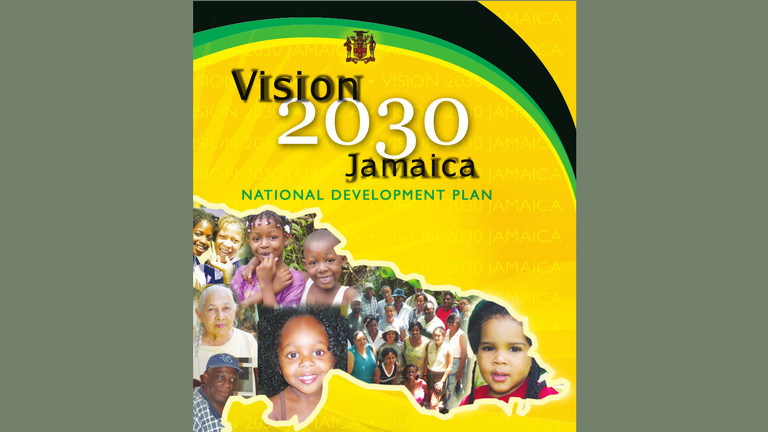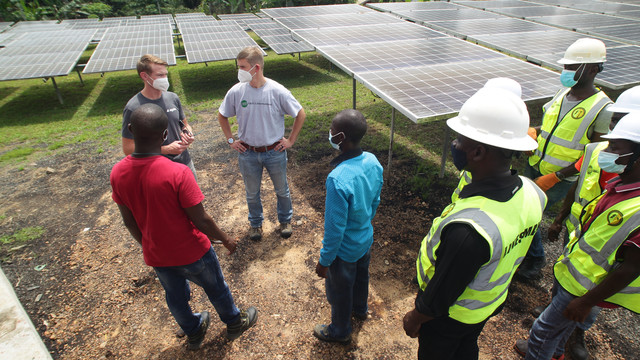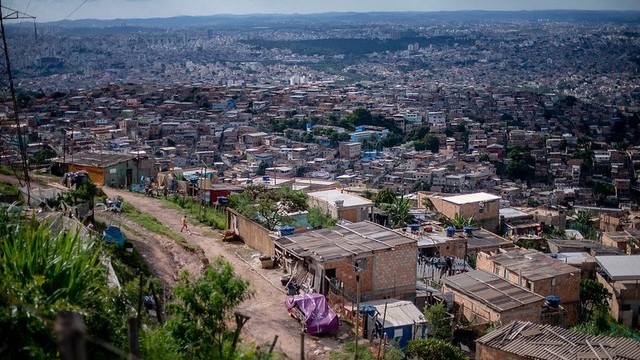One people, one vision
Countries with a strong sustainable development planning framework are finding that the Sustainable Development Goals (SDGs) work best as a political motivator for domestic action, rather than as a literal set of targets. Tighe Geoghegan explains the political case for SDGs from a Jamaican perspective.

The cover of Vision 2030 Jamaica, the country's first long-term national development plan.
The beautiful island nation of Jamaica, birthplace of reggae and nurturer of great athletes, is less known as a trailblazer for sustainable development. In 2009 the country adopted Vision 2030 Jamaica, a comprehensive national plan integrating the economic, social, environmental and governance dimensions of development.
Vision 2030 came out of a realisation by the then-Director General of the Planning Institute of Jamaica (PIOJ) that the country would only emerge from its "vicious cycle of low performance and build a quality society" by taking a "strategic and long-term" approach to development.
PIOJ charged 32 task forces with helping to prepare Vision 2030. With such wide stakeholder involvement, the final product is one that both government and society are proud of.
The vision's broad scope is reflected in its seven guiding principles:
- Transformational leadership
- Partnership
- Transparency and accountability
- Social cohesion
- Equity
- Sustainability (economic, social and environmental), and
- Sustainable urban and rural development.
Jamaica's national politics are deeply partisan, but Vision 2030, begun by one administration and completed by another, has been fully accepted as the national planning framework by both parties, and through two changes of government.
On a recent visit to Jamaica I learnt about the country's sustainable development progress and how it is approaching the SDGs and other aspects of the new international development framework.
Not surprisingly, I heard a lot about Vision 2030. I also found out how a country with an already strong foundation for sustainable development can get traction for its own agenda by drawing on the political power of the global framework.
On the international stage
Jamaica was active in the UN Open Working Group on SDGs. Its main concerns were that the goals and targets aligned with Vision 2030 (they do) and did not add commitments that the country would not be financially or legally able to take on.
And even though the SDGs add little to Jamaica's sustainable development ambition, participating in the negotiations was still seen as valuable. Working with other countries with similar characteristics, Jamaica was able to make a case for special international treatment for climate and shock-vulnerable Small Island Developing States and heavily indebted middle income countries. A number of the measures it advocated made their way into the 2030 Agenda.
The SDGs' move from the negotiating table to the UN High Level Political Forum gives Jamaica a platform and a 'ruler' for showing the world its excellent foundation for progress on sustainable development, by translating that progress into the international agreed language of the global goals and targets.
These international arenas also give Jamaica an opportunity to learn how other countries are dealing with common objectives and challenges.
Jamaica has recently started on the complex process of participating in REDD+, the UN mechanism designed to reduce emissions from deforestation and forest degradation in developing countries. The challenge seemed daunting until the 2016 UNFCCC Conference of Parties gave the Jamaican delegation an opportunity to speak with, and learn from, countries that have already successfully navigated the process.
Domestic accountability and capacity-building
As a small, resource-constrained country, Jamaica needs strong international partnerships to achieve its objectives. As a result, it takes its global commitments seriously.
Civil society activists and civil servants alike understand the political power of those commitments domestically – they know that if they frame their concerns and priorities around an international agreement, politicians pay attention. And because of the close alignment, the SDGs strengthen the government's allegiance to Vision 2030 by showing that national objectives are also global commitments.
In the same way, the SDGs can strengthen Jamaica's case for support from donors and international agencies. They can raise the profile of less visible development issues; for example, the 'teased out' way the SDGs link forests with other aspects of development provides credible and internationally sanctioned arguments for greater attention to, and investment in, forest management.
While for Jamaica most of the value in the SDGs relates to political capital, there is at least one way in which the structure of the goal framework can contribute to national efforts. Jamaica's government is built around discrete, poorly linked sectors, which often reside in different ministries despite being related. As a result there are few opportunities for staff to develop skills in integrated planning outside core agencies like the PIOJ.
But Vision 2030 helped show how different issues and sectors link. For example, it helped people think of climate change as a development issue rather than just an environmental one.
There is still a long way to go to develop the culture of integrated thinking and policymaking needed to achieve the aims of Vision 2030. But for PIOJ planners, the SDGs provide a concrete example of how the different dimensions of development interact with one another.
While the goal framework can seem overwhelming, breaking it down into bite-sized pieces can make it a useful planning tool.
Beware too-literal interpretations
While nearly everyone I spoke with saw value in the SDGs, some worried about "international agenda tedium" straining national systems and "robbing the SDGs of their value". That's why countries like Jamaica, with a strong sustainable development planning framework already in place, will get far more out of the SDGs by using them as a guide and political motivator for domestic action, rather than as a literal set of targets.
The research described here is being carried out by IIED in collaboration with the University of the West Indies' Institute for Sustainable Development.
Tighe Geoghegan (tigheg@gmail.com) is a senior associate of IIED.



